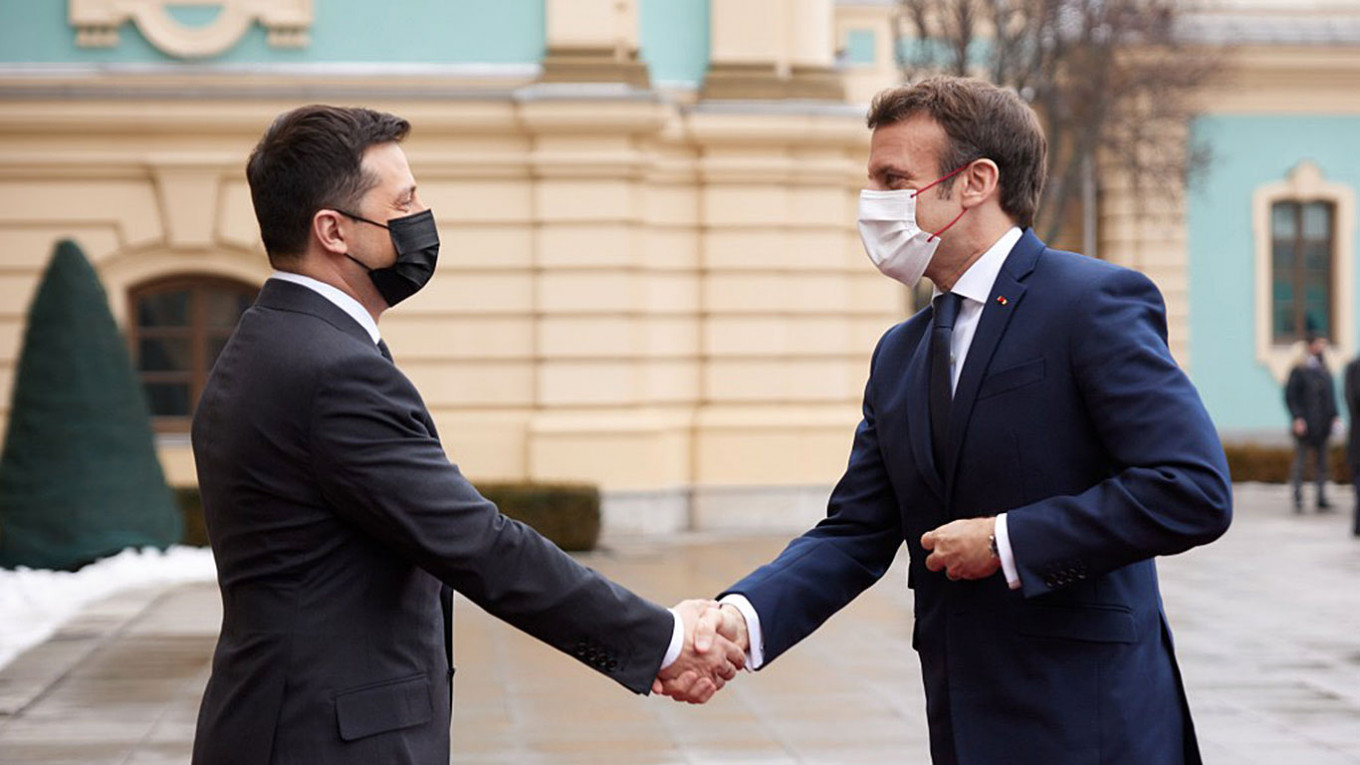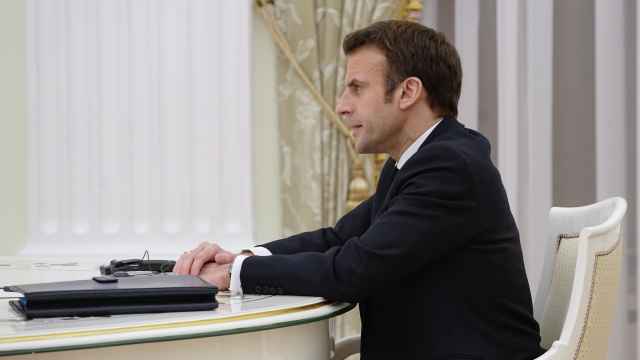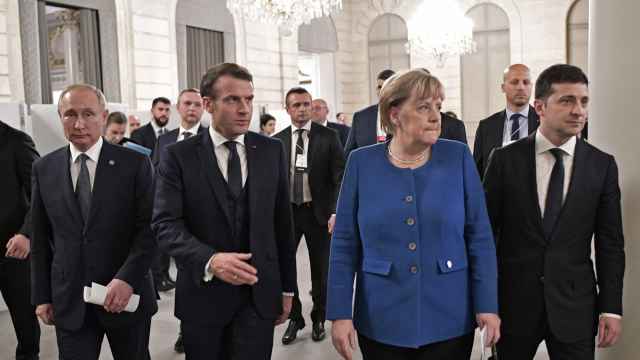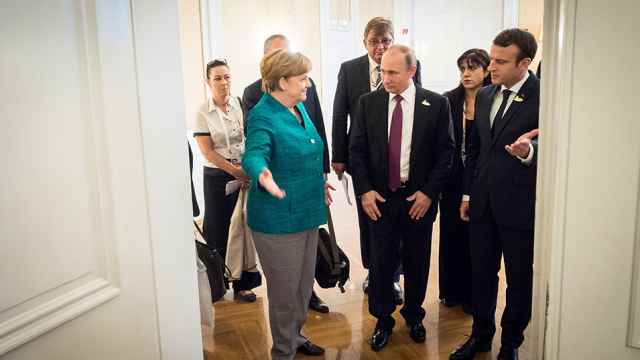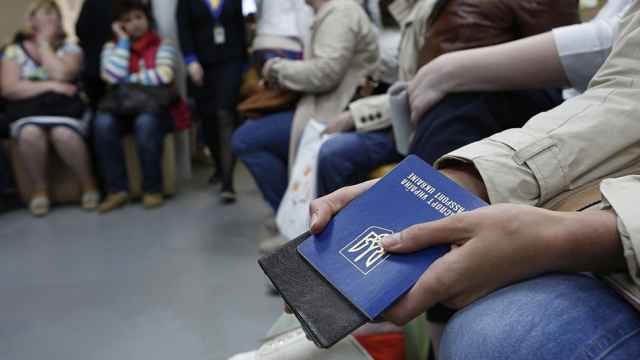French President Emmanuel Macron’s round of shuttle diplomacy in Moscow and Kyiv has launched a process that could lead to the defusing of tensions surrounding the Ukraine crisis and re-asserted Europe's role in the discussions, French Kremlin watchers told The Moscow Times.
Macron said after his marathon talks with Vladimir Putin on Monday that the Russian president told him Russia “would not be the source of an escalation,” and that his meeting with Ukraine’s President Volodymyr Zelenskiy meant he now saw the “possibility” of talks involving Moscow and Kyiv on the conflict in eastern Ukraine.
“The important thing is that Macron managed to establish a conversation with Putin on European security issues” Marie Dumoulin, director of the Wider Europe program at the European Council on Foreign Relations, told the Moscow Times on Tuesday.
“Until now, there was no such discussion channel with any European leader,” she added.
While Macron did not expect to immediately secure a deal, he came to Moscow with the intention of bringing Europe back to the diplomatic game, experts said.
Since December the Kremlin had shown little to no interest in speaking with Europe about its security demands regarding Ukraine and NATO, instead seeing the real interlocutor as the United States.
In December, Foreign Ministry spokeswoman Maria Zakharova said Russia didn’t believe the EU was ready to discuss security proposals.
“From the beginning of this crisis, the Russian authorities very clearly showed that they did not intend to talk to Europeans, but rather to Americans, about European security issues,” Dumoulin said.
Despite U.S. President Joe Biden’s efforts to consult with the EU, Brussels found itself uncomfortably sidelined as the U.S. and Russia discussed the future of Europe’s security order.
The EU's top diplomat Josep Borrell has repeatedly called for Europe to be included in the negotiations. In December, he told German paper Die Welt “nothing will be decided about us without us being there.”
In a recent trip to Ukraine, Borrel further said “we are no longer in Yalta times” — referring to the post-World War II Yalta summit where the U.S., Russia and the U.K. decided the fate of Europe.
Macron has argued that Europe needs to be able to maintain a dialogue with Russia since the beginning of his presidency in 2017, and even more so since Putin’s visit to France in 2019.
“In a way, the current situation is testing the relevance of Macron’s approach to Russia,” Dumoulin said.
Seeing Europe sidelined in December may have increased Macron’s frustrations but “may have led him to think ‘this is the chance to show that the approach I have been advocating for works’,” she added.
Macron has struggled to unite his European partners behind his strategy on Russia, while his administration has invested heavily in maintaining dialogue with Russia.
The French president believes that pragmatic relationships with Russia are essential to establishing long-term security in Europe.
“The European continent will never be stable, will never be secure, if we do not ease and clarify our relations with Russia,” he said in a speech at a major diplomatic conference in Paris in 2019.
In Moscow, Macron performed a difficult balancing act with Putin, repeating statements reaffirming his support for NATO’s principles and European unity, while agreeing that Russian concerns needed to be considered.
Open door
Igor Delanoë, Deputy Head of the French-Russian Analytical Center Observo, said Putin “seemed to have been positively surprised, or at least intrigued” by some of Macron’s proposals.
“Discussions, so far, have been reasonably constructive,” Delanoë said. “The Russians did not close the door.”
While Putin thanked Macron at a press conference after their meeting on Monday and said “a number of his ideas, proposals ... are possible as a basis for further steps,” he made no public commitments.
On Tuesday, the Russian state-run TASS news agency quoted Kremlin spokesman Dmitry Peskov as saying that any deal on Ukraine would be concluded with the United States.
“Given the current situation, Moscow and Paris could not have struck any deals. It is simply impossible,” Peskov said.
“Because France is both an EU member and currently holding the EU presidency, what’s more, France is a NATO member, where it doesn’t hold leadership — another country holds this bloc’s leadership,” Peskov added, referring to the U.S.
Long-term process
Pierre Vimont, France’s special envoy in Russia who has been coordinating French efforts to relaunch dialogue with Russia since 2019, said Macron’s visit was the start of a long-term diplomatic process.
“As the president said even before going to Moscow, no one was expecting immediate or spectacular results,” he told The Moscow Times.
“We now need to see how different parties will move forward and if there is good will on both sides.”
A Message from The Moscow Times:
Dear readers,
We are facing unprecedented challenges. Russia's Prosecutor General's Office has designated The Moscow Times as an "undesirable" organization, criminalizing our work and putting our staff at risk of prosecution. This follows our earlier unjust labeling as a "foreign agent."
These actions are direct attempts to silence independent journalism in Russia. The authorities claim our work "discredits the decisions of the Russian leadership." We see things differently: we strive to provide accurate, unbiased reporting on Russia.
We, the journalists of The Moscow Times, refuse to be silenced. But to continue our work, we need your help.
Your support, no matter how small, makes a world of difference. If you can, please support us monthly starting from just $2. It's quick to set up, and every contribution makes a significant impact.
By supporting The Moscow Times, you're defending open, independent journalism in the face of repression. Thank you for standing with us.
Remind me later.


